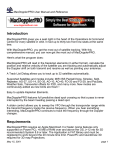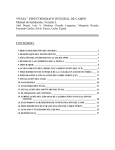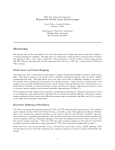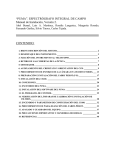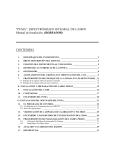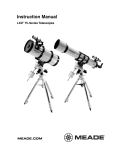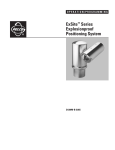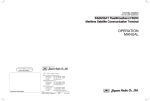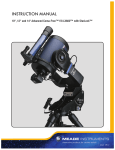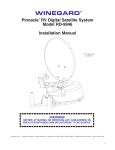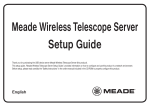Download Coronado SolarMax 40 Instruction manual
Transcript
SolarMax II Series ® H-a Telescopes With RichView™ Tuning 1 WARNING! Looking at the Sun can be very dangerous unless the proper precautions are taken and specialized solar viewing equipment, like Coronado Solar filters and telescopes are used. Never look at the Sun directly with your eyes. When using Coronado filters on a telescope not designed specifically for solar viewing, be sure to block all non-filtered optical components such as viewfinders to prevent the suns light from passing through. An inadvertent glance thought an unfiltered or improperly filtered optical system can cause immediate and permanent damage to the eye. Never allow unattended children to operate or be near a solar telescope system. Coronado SolarMax and SolarMax II hydrogen-alpha telescopes and filters are designed and tested to provide safe viewing of the Sun. These systems consist of two critical parts: The etalon filter that may be mounted at the front of the telescope or internally inside the telescope tube and the blocking filter that is mounted at the back of the telescope. Both of these components must be properly installed to provide safe solar viewing. Most Coronado blocking filters (BF filters) are installed in a special diagonal that mounts at the rear of the telescope and holds the eyepiece. Do not replace this diagonal with any other diagonal. Without the blocking filter inside the dedicated Coronado diagonal, light from the sun is not fully filtered and looking through the system can result eye damage even with a quick glance. READ THIS MANUAL COMPLETELY BEFORE ATTEMPTING TO USE YOUR NEW CORONADO PRODUCT. IT CONTAINS SPECIFIC INSTRUCTIONS REQUIRED FOR THE SAFE USE OF YOUR PRODUCT. Meade Instruments has night and day covered for the amateur astronomer. Meade is the leader in night time astronomy with the most advanced optical, mechanical and electronic systems for viewing the night sky. With Coronado and the development of the SolarMax II, Meade is the clear leader in solar day time observing as well. Whether you are imaging deep sky objects with your Meade astronomical telescope and DSI or gazing at our nearest star through a Coronado SolarMax telescope, keep an eye on the Meade team to provide you with the most technologically advanced and innovative product to enhance your enjoyment of astronomy. No matter where, or what time of day your interest in astronomy calls to you, we will be there with you. Night and Day, we’ve got you covered. 2 Table of Contents About Coronado® . . . . . . . . . . . . . . . . . . . . . . . . . . . . . . . . . . . . . . . . . . . . . . . . . . . . . . . . . . . 4 Filter Safety . . . . . . . . . . . . . . . . . . . . . . . . . . . . . . . . . . . . . . . . . . . . . . . . . . . . . . . . . . . . . . . 4 PST® Personal Solar Telescope . . . . . . . . . . . . . . . . . . . . . . . . . . . . . . . . . . . . . . . . . . . . . . 5-6 SolarMax® II 60 Telescope . . . . . . . . . . . . . . . . . . . . . . . . . . . . . . . . . . . . . . . . . . . . . . . . . . 7-8 SolarMax® II 90 Telescope . . . . . . . . . . . . . . . . . . . . . . . . . . . . . . . . . . . . . . . . . . . . . . . . . 9-10 SolarMax® II 40mm, 60mm and 90mm Filter Sets . . . . . . . . . . . . . . . . . . . . . . . . . . . . . . 11-12 Cleaning . . . . . . . . . . . . . . . . . . . . . . . . . . . . . . . . . . . . . . . . . . . . . . . . . . . . . . . . . . . . . . . . 13 Replacement Manuals and Accessories . . . . . . . . . . . . . . . . . . . . . . . . . . . . . . . . . . . . . . . . . 13 Definition of Terms. . . . . . . . . . . . . . . . . . . . . . . . . . . . . . . . . . . . . . . . . . . . . . . . . . . . . . . . . 14 Solar Facts . . . . . . . . . . . . . . . . . . . . . . . . . . . . . . . . . . . . . . . . . . . . . . . . . . . . . . . . . . . . . . 15 Troubleshooting . . . . . . . . . . . . . . . . . . . . . . . . . . . . . . . . . . . . . . . . . . . . . . . . . . . . . . . . . . . 16 Warranty . . . . . . . . . . . . . . . . . . . . . . . . . . . . . . . . . . . . . . . . . . . . . . . . . . . . . . . . . . . . . . . . 17 Observation Notes . . . . . . . . . . . . . . . . . . . . . . . . . . . . . . . . . . . . . . . . . . . . . . . . . . . . . . 18-19 3 About Coronado Coronado® was founded in 1997 by David Lunt and Geraldine Hogan as Coronado Technology Group. David Lunt’s 40 plus years experience at the forefront of optical design and innovation translated into patented technology allowing the classical FabryPérot etalon to be constructed in a novel way. Tremendous demand changed the initial concept of producing a few hydrogen-alpha (H-a) telescopes a month for the advanced solar amateur. As word got out that these telescopes and filters produced amazing views of the Sun, Coronado grew rapidly. As demand vastly exceeded the small company’s ability to produce, the owners of Coronado decided to sell their operation to a company with the experience in higher volume manufacturing but still had then dedication to quality and detail that Coronado was known for. That company is Meade Instruments. Since 1997 Meade Instruments’ Coronado brand has grown to become the largest selling solar telescopes and filters. We now manufacture four lines of H-a telescopes and filter systems from the low cost, high performance PST (Personal Solar Telescope) to the ultimate 90mm SolarMax II along with the specially designed Cemax series of eyepieces and custom solar accessories. In June of 2010 Meade Instruments Corp. announced the introduction of the revolutionary SolarMax II line of solar observing telescopes and filters. The new SolarMax II represents a breakthrough in solar observing with the new RichView™ tuning system. This patented system allows direct tuning of the primary etalon filter. No other commercially available H-a telescope can provide the tuning range and accuracy of the SolarMax II. Observers can now tune for the highest contrast views of active regions, flares, filaments, and other surface detail, or quickly and easily re-tune for prominences on the solar limb. We continue to maintain the founders philosophy for building filters — Safety, Quality, and Performance. You can rest assured that your new instrument has been hand assembled and tested before being sealed in the box. In fact, every telescope and filter is field tested on the Sun so we are confident you can look forward to a lifetime of fantastic H-a views of our dynamic Sun. If you have any questions please do not hesitate to contact us. Filter Safety Safety - It is widely known that there are inherent dangers involved with observing the Sun. Meade Instruments has always been, is, and always will be, obsessed with the safety of its products. A proposed new product is not released until it has been fully proven that it can be made completely safe for the user. All Coronado instruments are tested and sealed at our facilities as complete, safe, and working units. Do not attempt to disassemble any Coronado product, doing so will void your warranty and could compromise your safety. Before each use make sure your filter does not appear damaged in any way, if you have any doubts please call our customer support. Meade is obsessed with safety and you should be too. We recommend you establish a safety checklist for each viewing session, ensuring that all adaptors, filters and blocking filters are installed and secure before aligning the system to the sun. Make this safety check part of your observing routine. Never leave a solar telescope unattended. An additional safety consideration is exposure to the Sun. Always use sunscreen, and wear a hat and long sleeved shirt while observing. 4 PST® Personal Solar Telescope Congratulations on your purchase! Meade Instruments has shipped your Coronado PST dedicated H-a telescope fully assembled and ready for use. Be sure to read the safety and cleaning instructions on page 4 and 13 before using your PST telescope. You can refer to the diagrams below for questions regarding the components of your system. Please read these instructions in full before setting up your new PST telescope and contact customer service if you have any questions. Meade also makes a dovetail mounting block (product #DT-LXD75) compatible with the LXD75 mount and many other mounts on the market. Mounting – Meade manufactures and sells separately three (3) mounts suitable for the PST: the MALTA™ mount (Manual ALTitude Azmuth), the DSM altazimuth computer controlled mount and the LXD75 German equatorial computer controlled mount. The threads on the bottom of the PST are compatible with any ¼ 20 thread. Most standard photographic mounts and mounting hardware can be used to provide a safe, stable, and reliable set up. This is also compatible with piggyback mounting systems. Finding the Sun - The P.S.T.™ has been designed with an internal Sol Ranger™ Sun spotting device. There is a small pinhole on the front face of the P.S.T.™ body and a small opaque window on the top, near the eyepiece holder. When properly aligned on the Sun the pinhole will let in light that will be projected onto the opaque glass in the form of a small harmless ball. It is NOT necessary to put your eye up to the opaque glass. Best alignment will be found when this ball of light is near center but it is not always dead center. Adding a SM40/T-Max™ will obstruct the Sol Ranger- Do not put your eye up to the opaque glass. WARNING! Do not insert your eyepiece until you have confirmed that the telescope is securely mounted and all filter elements attached and secured. The Meade MALTA™ mount is a dedicated rugged, portable altazimuth mount designed for the PST. To use the MALTA mount, attach it to the PST using the two screws included with the MALTA mount Then secure the mount head to the base using the tension screw going through the top down into the base. The individual legs then thread into their holes. By loosening the tension screw one can adjust the azimuth or horizontal axis, retighten the tension screw to freeze that axis. The silver tension screw on the mount head will adjust the altitude or vertical axis when loosened and hold the PST firm when tightened down. Tuning and Focusing the PST - Because different features on the Sun are moving toward or away from the Earth, their light is Doppler shifted off the hydrogen-alpha line of 6562.8 Angstroms, you will need to adjust the tuning slightly to get the best highcontrast views of the features you want to observe. The PST is equipped with a tuning mechanism that allows the user to adjust performance of the solar filter. The purpose of this adjustment is to compensate for possible detuning of the filter due to the change RichView™ tuning ring for internal Etalon Focusing Knob PST® PST® Personal Solar Telescope 5 Tuning PST Double Stack 40 with RichView tuning - With a double stack system, follow this procedure for best results: After the PST telescope is pointed at the Sun and the image has been focused, rotate the knurled ring on the telescope in either direction slowly while looking at the image in the eyepiece to get the most detail and contrast. Now adjust the tilt of the external Etalon on the front of the telescope with the T-Max wheel to achieve the brightest image while eliminating any reflections. Finally, adjust the RichView tuning ring on the external Etalon to get the most detail and contrast for the feature you are viewing. Because double stacked systems operate at a very narrow band pass of only 0.5 Angstroms or less, more tuning is needed for different areas and features on the Sun. in operating conditions (such as barometric pressure that can change with elevation changes.) The adjustable tuner is located right at the end of the optical tube assembly where it merges to the rectangular body of the PST, and is easily recognized by the knurled rubber ring (see Pg. 5). The minute spectral adjustment of the etalon filter is accomplished by simply rotating this knurled ring in either direction. In most instances the filter adjustment will not be required – the PST is delivered properly tuned by Meade engineers. The judgment about occasional adjustment is made based on overall image quality and the ability to see the image details with a satisfactory contrast. NOTE: The maximum possible extent of a (relatively tight) rotation of the adjustable tuner is approximately 130°. No excessive force should be applied in an attempt to rotate the knurled ring further than mechanically allowed. The best achievable contrast of the image will be found within the limits of adjustment, and, once such image is obtained, no further improvement of the image quality can be gained by forcing the tuner. Double Stacking - This greatly increases contrast by narrowing the bandpass to <0.5Å and gives a spectacular 3D effect showing increased surface detail. The PST 40 telescope can be double stacked by adding an additional PST Etalon with T-Max (Product #SME-40). Contact your Coronado dealer or Meade Instruments directly for pricing. In search for a better solar image, the astronomer should first find the “sweet spot” by appropriately focusing the telescope using the focusing knob. Once the PST is appropriately focused, the edge of the solar disk will appear sharp. However, if, for example, the prominences are not seen after the telescope has been focused, the tuning lever for the internal etalon may be of help. In this case the knurled ring of the adjustable tuner should be appropriately turned until the sought contrast of the Sun’s chromosphere is apparent. PST Personal Solar Telescope Aperture - 40mm Focal Length - 400mm f/Ratio - f/10.0 Bandwidth (Single Stacked)- <1.0 Å Bandwidth (Double Stacked)- <0.5 Å Thermal Stability - 0.005 Å/°C Blocking - Full blocking >10-5 from EUV to far IR Surface details will generally require one setting, while prominences will require a different setting for maximum detail. Tmax™ tilt wheel RichView™ tuning ring for internal Etalon External Etalon unit Focusing Knob PST® PST® Personal Solar Telescope Double Stacked 6 RichView™ tuning ring SolarMax II 60 Dedicated H-a Telescope filter in place. Once the nylon set screws are loose the drawtube will easily slide in and out of the focuser but cannot be completely removed. Most eyepieces will come to focus when the drawtube is nearly fully extended but some variations in eyepieces may require different positioning of the drawtube. Secure the drawtube in its new position by retightening the nylon set screws. The drawtube should be fully inserted for storage. All adjustable screws are meant to be finger tight - do not over tighten. Congratulations on your purchase! Meade Instruments has shipped your Coronado SolarMax II telescope fully assembled and ready for use. Be sure to read the safety and cleaning instructions on page 4 and 13 before using your SolarMax II telescope. You can refer to the diagrams below for questions regarding the components of your system. Please read these instructions in full before setting up your new SolarMax II telescope and contact customer service if you have any questions. WARNING! Do not insert your eyepiece into the blocking filter until you have confirmed that the telescope is securely mounted and all filter elements attached and secured. Mounting - The clamshell mounting ring your SolarMax II telescope has been shipped with is compatible with any 1/4 20 thread. Most standard photographic mounts and mounting hardware can be used to provide a safe, stable, and reliable set up. This is also compatible with piggyback mounting systems. Meade manufactures and sells separately two mounts suitable for the SolarMax II 60: The DSM altazimuth computer controlled mount and the LXD75 German equatorial computer controlled mount. Meade also makes a dovetail mounting block (product #DT-LXD75) compatible with the LXD75 mount and many other mounts on the market. Finding the Sun - Meade has included the Coronado Sol Ranger Sun finder. This finder scope sits on top of the clamshell and allows a small, harmless, ball of light to be projected on to the opaque glass at its back end. By standing back from the Sol Ranger you can easily place this ball of light in the center of the glass and the telescope should be aligned with the Sun - Do not put your eye up to the opaque glass. Helical Focuser - Once you have the Sun in the FOV and the draw tubes extended, insert the eyepiece into the eyepiece retainer and tighten the thumbscrew to secure it. Adjust the helical focuser by holding between the thumb and fore finger and rotating in either direction. Draw Tube - - The SolarMax II series telescope has a very fine adjustment helical focuser that rotates around the OTA in order to achieve focus. This focuser also has a drawtube that will need to be slid in or out for “rough focus”. To do this locate and loosen the 2 nylon set screws located in-between the helical focuser and before the larger silver compression screw, do not adjust the silver compression screw as this is used to secure the blocking Tuning SolarMax II 60 with RichView Tuning System - Because different features on the Sun are moving toward or away from the Earth, their light is Doppler shifted off the hydrogen-alpha line RichView™ tuning lever for internal Etalon SolarMax II 60 7 of 6562.8 Angstroms, you will need to adjust the tuning slightly to get the best high-contrast views of the features you want to observe. After the SolarMax II telescope is pointed at the Sun and the image has been focused, move the RichView tuning lever up or down slowly while looking at the image in the eyepiece to get the most detail and contrast. Surface details will generally require one setting, while prominences will require a different setting for maximum detail. blocking filter. You cannot substitute another diagonal for the Coronado Blocking Filter Diagonal. This would create an unfiltered system and deliver light from the Sun that will cause damage to the eye. Contact Coronado if you are unsure which version you have. Imaging & Bino-Viewers - All SolarMax II series telescope will allow for both prime focus and eyepiece projection imaging with standard equipment. For prime focus imaging it is recommended that you thread the optical element of the CEMAX 2x Barlow to the draw tube of the blocking filter. being sure to replace the blocking filter into the draw tube once completed. Bino-Viewers will also come to focus using a Barlow or optical correcting system. There are many cameras that can be used for imaging - Coronado does not make adaptors. Tuning SolarMax II Double Stack 60 with RichView Tuning System - With a double stack system, follow this procedure for best results: After the SolarMax II telescope is pointed at the Sun and the image has been focused, move the RichView tuning lever on the telescope up or down slowly while looking at the image in the eyepiece to get the most detail and contrast. Now adjust the tilt of the external Etalon on the front of the telescope with the TMax wheel to achieve the brightest image while eliminating any reflections. Finally, adjust the RichView tuning ring on the external Etalon to get the most detail and contrast for the feature you are viewing. Because double stacked systems operate at a very narrow band pass of only 0.5 Angstroms or less, more tuning is needed for different areas and features on the Sun. SolarMax II 60 Telescope Aperture - 60mm Focal Length - 400mm f/Ratio - f/6.6 Bandwidth (Single Stacked)- <0.7 Å Bandwidth (Double Stacked)- <0.5 Å Thermal Stability - 0.005 Å/°C Blocking - Full blocking >10-5 from EUV to far IR Double Stacking - This greatly increases contrast by narrowing the bandpass to <0.5Å and gives a spectacular 3D effect showing increased surface detail. The SolarMax II 60 telescope can be double stacked by adding an additional SolarMax II Etalon with TMax (Product #SME60). Contact your Coronado dealer or Meade Instruments directly for pricing. Blocking Filters - The SolarMax II 60 telescope is available with a BF5, BF10 or BF15. All are in the form of a diagonal with eyepiece holder. You MUST use the Coronado diagonal that contains the RichView™ tuning lever for internal Etalon Tmax™ tilt wheel External Etalon unit RichView™ tuning ring SolarMax II 60 - Double Stack 8 SolarMax II 90 Dedicated H-a Telescope and the helical focuser. Once the nylon set screws are loose, fully extend draw tube #2. Retighten the set screws before proceeding. To extend drawtube # 1 locate the set screws between the helical focuser and the end of the telescope. Once loosened the drawtube will extend but cannot be removed. Retighten the setscrews before proceeding. Most eyepieces will come to focus when the drawtubes are nearly fully extended but some variations in eyepieces may require different positioning of the drawtube. Bino-viewers will require very little extension of the drawtubes and imaging equipment will vary by make. The drawtubes should be fully inserted for storage. All adjustable screws are meant to be finger tight - do not over tighten. Congratulations on your purchase! Meade Instruments has shipped your Coronado SolarMax II telescope fully assembled and ready for use. Be sure to read the safety and cleaning instructions on page 4 and 13 before using your SolarMax II telescope. You can refer to the diagrams below for questions regarding the components of your system. Please read these instructions in full before setting up your new SolarMax II telescope and contact our customer service if you have any questions. Mounting - The clamshell mounting ring your SolarMax II telescope has been shipped with is compatible with any 1/4 20 thread. Most standard photographic mounts and mounting hardware can be used to provide a safe, stable, and reliable set up. This is also compatible with piggyback mounting systems. Meade manufactures and sells separately one mount suitable for the SolarMax II 90: The LXD75 German equatorial computer controlled mount. Meade also makes a dovetail mounting block (product #DT-LXD75) compatible with the LXD75 mount and many other mounts on the market. WARNINGI Do not insert your eyepiece into the blocking filter until you have confirmed that the telescope is securely mounted and all filter elements attached and secured. Finding the Sun - Meade has included the Coronado Sol Ranger Sun finder. This finder scope sits on top of the clamshell and allows a small, harmless, ball of light to be projected on to the opaque glass at its back end. By standing back from the Sol Ranger you can easily place this ball of light in the center of the glass and the telescope should be aligned with the Sun - Do not put your eye up to the opaque glass. Draw Tubes - The SolarMax II 90 telescope has a very fine adjustment helical focuser that rotates around the OTA in order to achieve focus. This focuser also has two drawtubes that will need to be adjusted for “rough focus”. To do this locate and loosen the 2 nylon set screws located in-between the gold colored OTA Helical Focuser - Once you have the Sun in the FOV and the draw tubes extended insert the eyepiece into the eyepiece retainer and RichView™ tuning lever for internal Etalon Draw tube #1. Draw tube #2. SolarMax 90 SolarMax II 90 9 the bandpass to <0.5Å and gives a spectacular 3D effect showing increased surface detail. The SolarMax II 90 telescope can be double stacked by adding an additional SolarMax II Etalon with TMax (Product #SME90). Contact your Coronado dealer or Meade Instruments directly for pricing. tighten the thumbscrew to secure it. Adjust the helical focuser by holding between the thumb and fore finger and rotating in either direction. Tuning SolarMax II 90 with RichView Tuning System - Because different features on the Sun are moving toward or away from the Earth, their light is Doppler shifted off the hydrogen-alpha line of 6562.8 Angstroms, you will need to adjust the tuning slightly to get the best high-contrast views of the features you want to observe. After the SolarMax II telescope is pointed at the Sun and the image has been focused, move the RichView tuning lever up or down slowly while looking at the image in the eyepiece to get the most detail and contrast. Surface details will generally require one setting, while prominences will require a different setting for maximum detail. Blocking Filters - The SolarMax II 90 telescope is available with a BF15 or BF30. The BF15 version is pictured below. The BF30 version will appear to be the same. However the BF30 will be mounted inside the telescope and the diagonal supplied will be without any blocking filter. The SolarMax II 90 telescope with an internal BF30 can be used without the diagonal to mount imaging equipment in a straight through configuration but drawtube #1 will still be 1.25”. If you have the BF15 version you MUST use the diagonal. You cannot substitute another diagonal for the Coronado Blocking Filter Diagonal. This would create an unfiltered system and deliver light from the Sun that will cause damage to the eye. Contact Coronado if you are unsure which version you have. Tuning SolarMax II Double Stack 90 with RichView Tuning System - With a double stack system, follow this procedure for best results: After the SolarMax II telescope is pointed at the Sun and the image has been focused, move the RichView tuning lever on the telescope up or down slowly while looking at the image in the eyepiece to get the most detail and contrast. Now adjust the tilt of the external Etalon on the front of the telescope with the TMax thumb wheel to achieve the brightest image while eliminating any reflections. Finally, adjust the RichView tuning ring on the external Etalon to get the most detail and contrast for the feature you are viewing. Because double stacked systems operate at a very narrow band pass of only 0.5 Angstroms or less, more tuning is needed for different areas and features on the Sun. SolarMax II 90 Telescope Aperture - 90mm Focal Length - 800mm f/Ratio - f/8.8 Bandwidth (Singel Stacked) - <0.7 Å Bandwidth (Double Stacked)- <0.5 Å Thermal Stability - 0.005 Å/°C Blocking - Full blocking >10-5 from EUV to far IR Double Stacking - This greatly increases contrast by narrowing RichView™ tuning lever for internal Etalon Draw tube #1. Tmax™ tilt wheel Draw tube #2. SolarMax 90 External Etalon unit RichView™ tuning ring SolarMax II 90 Double Stack 10 SolarMax II 40mm, 60mm and 90mm Filter Sets Congratulations on your purchase of a SolarMax II H-a filter set! Be sure to read the safety and cleaning instructions on page 4 and 13 before using your SolarMax II filter. You can refer to the diagrams below for questions regarding the components of your system. Never point your telescope at the sun until your filter set is fully assembled on the telescope. Please read these instructions in full before setting up your new filter set and contact our customer service if you have any questions. Before purchasing any of the accessories list below please contact Meade customer service for guidance regarding correct selection and mounting. Adaptor Plates - In order to mount the external etalon filter unit on your telescope, with the exception of a few refractors, you will need an adaptor plate. Meade does not manufacture or supply these adaptors and is not responsible for the performance and safety of our filters when used with these adaptor plates. When mounting Coronado filters on telescopes other than Coronado SolarMax or SolarMax II telescopes, the user assumes the responsibility for the correct mounting and safety of the system. Mounting SolarMax II - Never point your telescope at the sun until your filter set is fully assembled on the telescope. Coronado recommends that you have your telescope fully mounted and pointing away from the Sun while attaching the filters. The Tmax is designed to be mounted on the objective lens of your telescope either directly or via an adaptor plate. Make sure that the Tmax is fully threaded into the adaptor plate or telescope objective cell. Blocking Filters - This is an essential component of your H-a set up and must be installed for the system to work and be safe to use. BF5, BF10, BF15 - Each of these are housed in a 1.25” right angle diagonal. Slide the silver draw tube into the focuser and tighten the retention system of your telescope. If you have a 2” focuser you will need a reducer to 1.25”. Meade manufactures a Zero Length Adaptor for this purpose that does not add travel to the focuser, call us for details. The BF15 is also available in a 1.25” straight through configuration for an additional charge. BF30 - This is a 2” straight through design of our BF series, designed for use on telescopes with FL of 1,500mm to 3,000mm. Slide the silver draw tube into the focuser and tighten the retention system of your telescope. Coronado Tmax™ tilt wheel External Etalon unit RichView™ tuning ring Side View Front View 11 recommends using a 1.25” diagonal and eyepiece for visual work and has provided a Zero Length Adaptor with your BF30. Some two inch accessories may not come to focus and are not recommended. Tuning SolarMax II Filter with RichView Tuning System - After the SolarMax II filter system is fully installed on the telescope, pointed at the Sun and focused, adjust the the tilt of the external Etalon on the front of the telescope with the Tmax thumb wheel to achieve the brightest image while eliminating any reflections. Finally, adjust the RichView tuning ring on the external Etalon to get the most detail and contrast for the feature you are viewing. Double Stacking - This greatly increases contrast by narrowing the bandpass to <0.5Å and gives a spectacular 3D effect showing increased surface detail. The SolarMax II filters can be double stacked by adding an additional SolarMax II Etalon with TMax of the same aperture. Contact your Coronado dealer or Meade Instruments directly for pricing. Eyepieces - The best eyepieces for solar viewing are Coronado’s CEMAX™ contrast enhanced series eyepieces. Conventional night time eyepieces can also be used, the fewer elements in the optical system the better the view - try to use 1.25” eyepieces with 2 to 4 elements at the most to reduce spurious light. Dark Cloth - One easy way to reduce incidental light from entering your eye is to use a dark cloth to completely cover your head and the eyepiece. The inside should be black but a reflective surface on the outside is recommended to avoid heat build up. Location - One of the benefits of owning a Coronado solar observing set up is the portability of the system. For optimal seeing avoid setting up on heat reflective surfaces such as concrete or tarmac. Grass, water, or low trees are your best surroundings for viewing. WARNING Do not insert your eyepiece into the blocking filter until you have the telescope securely mounted and the SolarMax II element attached and secured. SolarMax II Series Filters Filter Type - Interference filter with hard non-degradable coatings Bandwidth - <0.7 Å Thermal Stability - 0.005 Å/°C Arc Blocking - Full blocking >10-5 from EUV to far IR 12 Cleaning Should your filter get a build up of loose dirt particles on any surface use a static free lens brush to gently “sweep” it clean. Fingerprints and other residue can be cleaned using a high grade optical solution applied to an optical tissue. Using a circular motion work from the outside edge in towards the center. As these are hard coatings you can be firm but do not rub. Finish with an anti-static lens cloth. All of these cleaning items can be purchased through a camera/telescope dealer. Never use the following items on any section of your filter. 1. Compressed Air 2. Acetone 3. Anything with acidic properties 4. Any fabric not intended to clean optical coatings 5. Household cleaners If you have questions please contact our customer support. Care The telescopes and filters, if used properly, will not degrade with exposure to the Sun’s rays. You may leave your system set up in the Sun, even tracking the Sun, all day without risk. When your system is not being used it should be stored in a cool, dry location in the foam-lined case it was shipped in and with the included protective caps securely in place. In locations with excessive humidity placing a silica packet in the box is advised. Provided you do not drop or subject the telescope or filter to rough handling, it will work as well years from now as it does today. We use hard coatings throughout the system to ensure uniform performance for years to come. It is safe to carry your filters on airplanes and to pass them through X-Ray machines. Replacement Manual and Accessories Replacement Manual - Should this manual tear or be damaged you can download and print a free replacement from our website www.coronadofilters.com by selecting “Instructions” from the drop down menu. From this page you can download the entire catalog, any individual pages, and extra sheets for recording your observations. There is a nominal fee to have a new instruction manual shipped from Coronado, please call for details. Accessories - As well as making the safest and best performing solar filters and telescopes we offer a select line of accessories to enhance your enjoyment and expand the use of your new system. Adaptor plates - You can use your SolarMax II series filter on more than one telescope by purchasing the adaptor from Coronado. CEMAX Eyepieces - The best eyepieces for H-a observing. In fact these are the only eyepieces built specifically to have their peak transmittance at H-a. Using optimized coatings to enhance contrast and minimize glare, we have set the standard for the market. Available in 25mm, 18mm, 12mm, and a 2x Barlow, 20mm eye relief, 52 degree FOV. You will see the difference! Call or see our website for package deals. Solar Observers Hat - Made from UV protective material this high quality hat is the one to wear observing the sun or anytime you are outside. Features include Coronado logo on the front and back, extra long bill for protection, rear drape to protect your neck and act as a shade cloth, machine washable, one size fits all. It is important that you take necessary precautions to protect your skin when solar observing. Long sleeves, a hat and good quality sun screen are essential accessories for the smart observer. 13 Definition of Terms Prominences — H-a emissions projecting beyond the limb of the sun, consisting of complex clouds or streamers of ionized hydrogen above or in the Chromosphere. Filaments - Prominences seen against the face of the sun, appearing as long narrow dark streamers or diffuse dark areas. Active Region - Active regions are the result of enhanced magnetic fields and appear darker than the surrounding areas with a roughly circular shape. Active regions show plage, sunspots, and flares. Plage - Patchy H-a brightening on the solar disk, usually found in or near active regions, which can last for several days. These are found in areas of nearly vertical emerging or reconnecting magnetic lines. Sunspots - Spots of varying size usually consisting of a dark central region (umbra) and a lighter halo consisting of many short fine fibrils (penumbra). Flares - A sudden eruption of energy in the solar atmosphere lasting minutes to hours, from which radiation and particles are emitted. Chromosphere - An incandescent, transparent layer of gas, primarily hydrogen, several thousand miles in depth, lying above and surrounding the Photosphere of the Sun and beneath the transition region of the Corona. FOV - Field of View. This describes, in degrees, the area of sky one can see when looking through the eyepiece. OTA - Optical Tube Assembly. This is the main body of a telescope. H-a - A wavelength of light at 656.3nm or 6562.8 Angstroms (1nm = 1 billionth of a meter) Angstrom - A unit of measurement for the wavelength of light. (1A= O.1nm) Bandpass - A filter’s bandpass tells how wide a region of the light spectrum is transmitted around the primary wavelength. The narrower the bandpass, the more surface detail becomes visible on the Sun. Coronado can further narrow the bandpass of your primary filter by adding a matched filter of the same size to the objective or by placing a smaller secondary filter in the optical train. The term “double stacking” is used to describe this process. E.R.F. - Energy Rejection Filter. Prevents UV and IR light from entering the telescope. Etalon - The heart of a Coronado filter. Composed of optics with tolerances 4 times tighter than those used in the Hubble telescope. 14 Solar Facts The Sun is on average 93 million miles (150 million km) away from Earth and 900,000 miles (1.4 million km) across. The Earth is about 8,000 miles (13,000 km) across. Think of the Sun as a basketball and Earth as pin head and you have the proper proportions. It takes a little over 8 minutes for light from the Sun to reach Earth. Approximately 1 million earths would fit inside the Sun. Solar radius =695,990 km =432,470 mi =109 Earth radii Solar mass =1.989 1030 kg =4.376 1030 lb =333,000 Earth masses Solar luminosity (energy output of the Sun) = 3.846 1033 erg/s Surface temperature =5770 K =10,400 °F Surface density =2.07 10-7 g/cm3 =1.6 10-4 Air density Surface composition =70% H, 28% He, 2% (C, N, 0, ...) by mass Central temperature =15,600,000 K =28,000,000 °F Central density = 150 g/cm3 =8x Gold density Central composition =35% H, 63% He, 2% (C, N, 0, ...) by mass 15 Troubleshooting Here is a quick reference guide to answer some of the most commonly asked questions and solve the most common problems for the new Solar observer. I can’t find the Sun - One of the hardest things to master is lining up your telescope on the Sun. You can use a technique based on minimizing the shadow on the ground. This method will work by standing in front of and to the side of your set up. You can see the SolarMax casts a shadow onto the lip of the T-Max™, once you get rid of this shadow you should be on the Sun. Also try and use a 25mm to 30mm eyepiece to lower the magnification. However, by far the easiest way of lining up the sun is to use one of our Sol Ranger™ Sun finders. Using a mount with a Meade Autostar can be helpful in locating the Sun, especially when used in conjunction with the Sol Ranger. I found the Sun but it won’t focus. - Make sure that the drawtube or tubes have been extended. If you still can’t achieve focus you may be looking at a ghost image or reflection of the Sun. Move the telescope’s FOV around slightly and you will find the actual image. If this doesn’t work then you should contact customer service. I don’t see any detail. - H-a light is very far into the red end of the spectrum and our eyes are not, initially, very sensitive to this. The more you view the more detail you will pick up. The average observer takes around 3 months to become fully accustomed to viewing subtle detail in H-a light . Another important factor is the weather, bad seeing conditions will limit the amount of detail you can see. 16 Meade Instruments Corp. Warranty for Coronado Products Meade Instruments Corp. 27 Hubble, lrvine, CA 92618 Phone: 800-626-3233 Thank you for your purchase of a Meade Instruments’ CORONADO product. Upon receiving your instrument, please examine it thoroughly. Notify your supplier immediately should any visible signs of exterior damage to the package be present. This filter was field tested and rigorously evaluated before leaving the factory. It is important that you sign, where indicated, and submit the applicable portion of this warranty form within 30 days of the noted date shipped and/or receipt from a dealer, to the address shown above. Make sure to keep a copy for your records. Failure to retum the warranty form portion within thirty (30) days of RECEIPT DATE of filter will render this warranty VOID. Meade Instruments Corp - Coronado limited Warranty Meade Instruments Corp warrants the product against defects in materials and workmanship for a period of sixty (60) months from the date of delivery. Once accepted by the Customer and the warranty form returned, the filter will be considered to be in good working order. Any subsequent de-contacting of the Fabry-Pérot etalon within the filter system, is not covered by this warranty nor is any other subsequent damage to the blocking filter. Any modification, alteration, disassembly, damage to or tampering with the PRODUCT or any of its components will void the warranty, and, MAY MAKE USE OF THE INSTRUMENT UNSAFE. Please review WARNING contents below. RGA Number Required: Prior to the return of any product or part, a Return Goods Authorization (RGA) number must be obtained from Meade by writing or calling 800-626-3233 (800-62-MEADE). Each returned part or product must include a written statement detailing the nature of the claimed defect, as well as the owner’s name, address and phone number. RETURN OF THE PRODUCT IN ANY OTHER TYPE OF PACKAGING, OTHER THAN THE ORIGINAL AS SUPPLIED BY MEADE INSTRUMENTS, WILL VOID THE WARRANTY. The warranty set forth above shall be IN LIEU of any other warranty, expressed or implied, including, but not limited to, any implied warranty of MERCHANTABILITY or fitness, for a particular purpose. WARNING: UNDER NO CIRCUMSTANCES SHOULD THE USER ATTEMPT TO DISASSEMBLE OR REMOVE ANY PART OF THE PRODUCT. THE FILTER HAS BEEN SEALED AFTER FINAL TESTING AND HAS BEEN CONSTRUCTED TO PERMIT SAFE SOLAR VIEWING. ANY ALTERATION, DISASSEMBLY, DAMAGE OR TAMPERING TO THE PRODUCT WILL COMPROMISE ITS SAFETY, VOID THE WARRANTY AND, MAY RESULT IN PERSONAL INJURY. IF THE PRODUCT IS TO BE USED IN CONJUNCTION WITH OTHER OPTICAL INSTRUMENTS, IT IS IMPERATIVE THAT ALL OPTICS OF SUCH OTHER INSTRUMENTS BE FULLY COVERED TO AVOID ACCIDENTAL VIEWING THROUGH THOSE INSTRUMENTS. WE RECOMMEND THAT THE USER EMPLOY A SOLAR VIEWING CHECKLIST SO AS TO AVOID ACCIDENTAL MISUSE OF THE PRODUCT, WHICH MAY RESULT IN PERSONAL INJURY. Date shipped: ________________________ Serial number: ________________________________________ Complete this form; make a copy for your records and mail to Meade Instruments Corp. 27 Hubble, Irvine, CA 92618 Serial number: Date shipped: __________________________________ Please refer to the numbers above in any type of correspondence Date received:__________________________________ Clip-out along dashed line. Purchased from: _______________________________________________________________________________ Name (please print): _____________________________________________________________________________ Address: _____________________________________________________________________________________ How did you learn of this product?: __________________________________________________________________ Telephone:_________________________ Email: _______________________________ Signature: ________________________________________________________ This warranty gives you specific rights. You may have other rights which vary from state to state 17 Observation Notes Pages 18 and 19 are left blank. 18 19 © 2010 Meade Instruments Corp. reserves the right to change product specifications or to discontinue products without notice. 11/2010 REV 1 C901 901 20




















